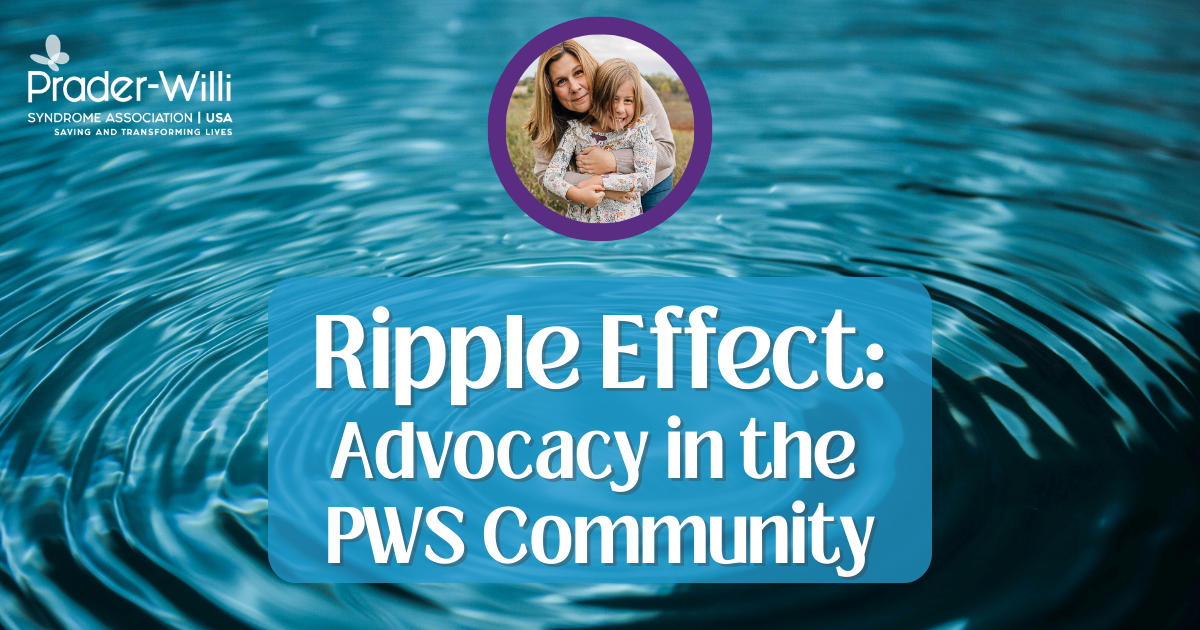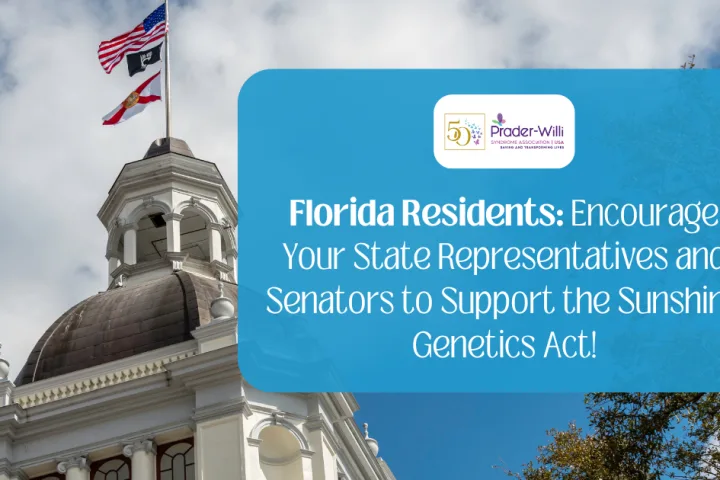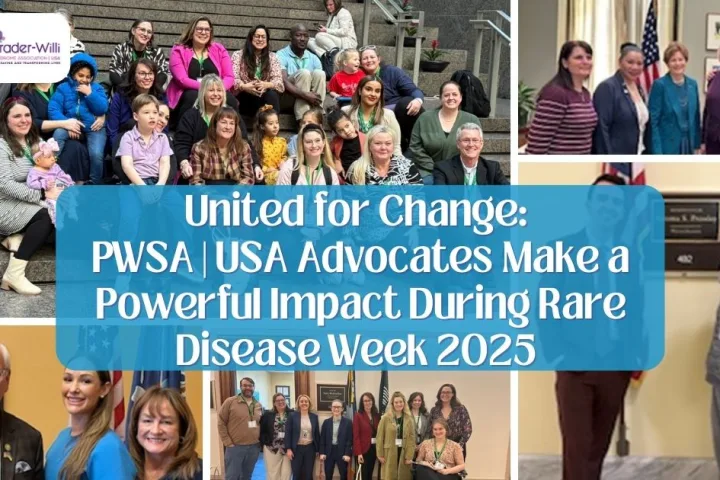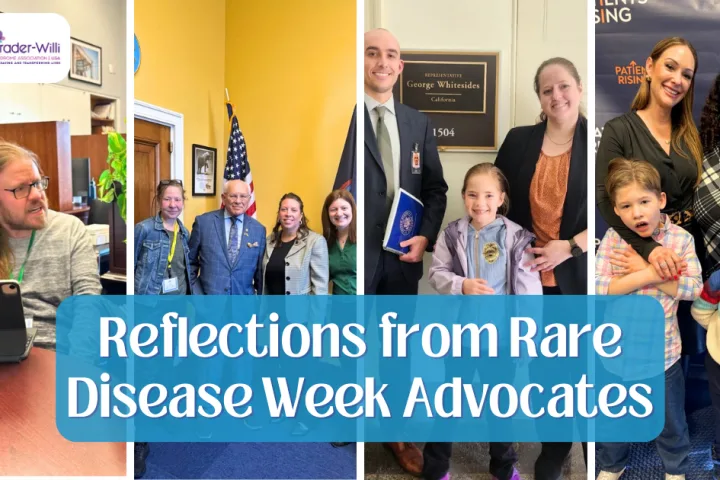“Unless someone like you cares a whole awful lot, nothing is going to get better. It’s not.”
—The Lorax, Dr. Seuss
A reluctant, “OK.” That’s how I got involved in advocacy with PWSA. Pretty unexciting, isn’t it? Well, so is the first plop when you throw a stone in a pool, yet the ripples continue to grow and grow. In much the same way, I didn’t come in to this fight with a big splash, but my confidence and involvement as an advocate continue to grow.
How I Began
In 2019, I reached out to PWSA in hopes of lending my time and skills to the Family Support group, but I was encouraged to join the Advocacy group instead. At the start, I did more listening than speaking because it was all so new to me, and I didn’t understand how I fit in. As leadership changed and developed, so did the Advocacy group. As it became more active, ambitious, and focused, so did I. I became more and more involved and vocal. I wrote and then began calling my legislators.
The Asks
Voices of Advocacy
Having been a father for the last 4 years of Angelica, I have seen and heard of the shortfalls our love ones encounter while living with Prader-Willi Syndrome (PWS). Furthermore, I did not encounter anyone of my ethnicity for three years, my career or gender within the PWSA|USA Advocacy Team. Therefore, I felt it was my spiritual duty to get involved in advocacy to be a VOICE for my daughter and others affected by PWS especially those of black and brown dissent. My desire is to use my voice to 1. Seek treatments or legislation to address the issues associated with PWS. 2. Ensure diversity and inclusion is considered in all aspect of PWS drug/treatment development (clinical trials) 3. Show the importance of the involvement of person of black and brown dissent, military service and male and also as a way to say it is OK to not be OK, but we have to get involved to secure the Hope our loved ones desire and deserve. -Charles Conway
I got involved with PWSA and advocacy because I saw a need in my state of West Virginia. Someone with Prader-Willi, like my daughter, is not being supported like she/they should be. Even at five years old, she is not able to qualify for services that would help her and our family tremendously. I believe part of it is that elected officials do not know what PWS is, and that we need support. I have a voice to make change. Advocacy means getting programs and assistance that is needed and explaining to elected officials why it’s needed. As she gets older, the need is not just on a family level, but an individual level. How are we setting her future up for success? As a family, we are encountering new challenges like behavior and food-seeking. Things we didn’t face when she was younger. We need medication and policies for medication approved or changed. We are a united front, and the more that advocate, the stronger we are. Strength in numbers make change. -Sheri Mills
I became an advocate to be a voice for those who are not able to. I want to make a difference for everyone living with a rare disease. -Justice Rickenbach
I got involved with our Advocacy to do everything I could do to make my son’s life better. Having been to DC twice, it’s astonishing the connections we have made. The Senate and House offices we have met are extremely helpful and supportive. Teaching others about our stories and fight has allowed me to grow in resistance and strength. Can’t wait to go back and reconnect with all of them. -Andrew Gilly
DC Fly-In
Where to Begin
Social Media:
- Educate and build awareness through social media.
- February 29 (the rarest day on the calendar), is Rare Disease Day, use this day to talk about PWS and what having someone with a rare disease in your family means for you. Learn about the Promising Pathways Act and talk about why it matters to you!
- May is PWS Awareness Month and, thanks to PWSA USA’s legislative advocacy efforts in DC, May 15 is now National PWS Awareness Day! Use this special month and day to celebrate your child and family, what PWS is, and how people can help with fundraising and advocacy.
Get Involved in Legislative Advocacy:
-
Look toward the bottom of the PWSA USA Advocacy page for a link to automatically send emails to your legislators. It’s that easy.
-
Find out who represents you and what they’re up to through PWSA USA’s Advocacy Website
-
Call or write your representatives to share your experience with PWS, and what they can do to help. If you need help with this, PWSA USA will help you. We have experienced advocates who are willing to join you on calls and zoom meetings to support you in effectively sharing your story. Contact advocacy@pwsausa.org for more information.
-
Get involved in the PWS State Qualifier Campaign. More than half of our great states have yet to recognize PWS as a qualifying condition for developmental disabilities categorization, which gatekeeps access to a number of state-funded supports and services.
-
Join the advocacy work group! Contact advocacy@pwsausa.org
-
Please don’t miss the wonderful Advocacy Toolkit developed with Patients Rising. We are so lucky to be collaborating with and working alongside other rare disease organizations. Much of the legislation we support benefits all rare disease drug development in hopes for a better future, not just for the PWS community, but an estimated 25 to 30 million Americans affected by rare diseases. We are not alone in this fight for hope. I hope you join us.
Fundraising
-
Join the Walk A Mile in Their Genes fundraiser by donating or creating your own fundraising page! A great way to support PWSA USA’s advocacy efforts and their ability to sponsor participants is to join the current Walk A Mile in Their Genes fundraising campaign, going until March 18. The website to register is here and the social media toolkit is linked in the top menu or here.
Share this!





 Jennifer Bolander has been serving as a Special Education Specialist for PWSA (USA) since October of 2015. She is a graduate of John Carroll University and lives in Ohio with her husband Brad and daughters Kate (17), and Sophia (13) who was born with PWS.
Jennifer Bolander has been serving as a Special Education Specialist for PWSA (USA) since October of 2015. She is a graduate of John Carroll University and lives in Ohio with her husband Brad and daughters Kate (17), and Sophia (13) who was born with PWS. Perry A. Zirkel has written more than 1,500 publications on various aspects of school law, with an emphasis on legal issues in special education. He writes a regular column for NAESP’s Principal magazine and NASP’s Communiqué newsletter, and he did so previously for Phi Delta Kappan and Teaching Exceptional Children.
Perry A. Zirkel has written more than 1,500 publications on various aspects of school law, with an emphasis on legal issues in special education. He writes a regular column for NAESP’s Principal magazine and NASP’s Communiqué newsletter, and he did so previously for Phi Delta Kappan and Teaching Exceptional Children. Evan has worked with the Prader-Willi Syndrome Association (USA) since 2007 primarily as a Crisis Intervention and Family Support Counselor. Evans works with parents and schools to foster strong collaborative relationships and appropriate educational environments for students with PWS.
Evan has worked with the Prader-Willi Syndrome Association (USA) since 2007 primarily as a Crisis Intervention and Family Support Counselor. Evans works with parents and schools to foster strong collaborative relationships and appropriate educational environments for students with PWS. Dr. Amy McTighe is the PWS Program Manager and Inpatient Teacher at the Center for Prader-Willi Syndrome at the Children’s Institute of Pittsburgh. She graduated from Duquesne University receiving her Bachelor’s and Master’s degree in Education with a focus on elementary education, special education, and language arts.
Dr. Amy McTighe is the PWS Program Manager and Inpatient Teacher at the Center for Prader-Willi Syndrome at the Children’s Institute of Pittsburgh. She graduated from Duquesne University receiving her Bachelor’s and Master’s degree in Education with a focus on elementary education, special education, and language arts. Staci Zimmerman works for Prader-Willi Syndrome Association of Colorado as an Individualized Education Program (IEP) consultant. Staci collaborates with the PWS multi-disciplinary clinic at the Children’s Hospital in Denver supporting families and school districts around the United States with their child’s Individual Educational Plan.
Staci Zimmerman works for Prader-Willi Syndrome Association of Colorado as an Individualized Education Program (IEP) consultant. Staci collaborates with the PWS multi-disciplinary clinic at the Children’s Hospital in Denver supporting families and school districts around the United States with their child’s Individual Educational Plan. Founded in 2001, SDLC is a non-profit legal services organization dedicated to protecting and advancing the legal rights of people with disabilities throughout the South. It partners with the Southern Poverty Law Center, Protection and Advocacy (P&A) programs, Legal Services Corporations (LSC) and disability organizations on major, systemic disability rights issues involving the Individuals with Disabilities Education Act (IDEA), Americans with Disabilities Act (ADA), and the federal Medicaid Act. Recently in November 2014, Jim retired.
Founded in 2001, SDLC is a non-profit legal services organization dedicated to protecting and advancing the legal rights of people with disabilities throughout the South. It partners with the Southern Poverty Law Center, Protection and Advocacy (P&A) programs, Legal Services Corporations (LSC) and disability organizations on major, systemic disability rights issues involving the Individuals with Disabilities Education Act (IDEA), Americans with Disabilities Act (ADA), and the federal Medicaid Act. Recently in November 2014, Jim retired.